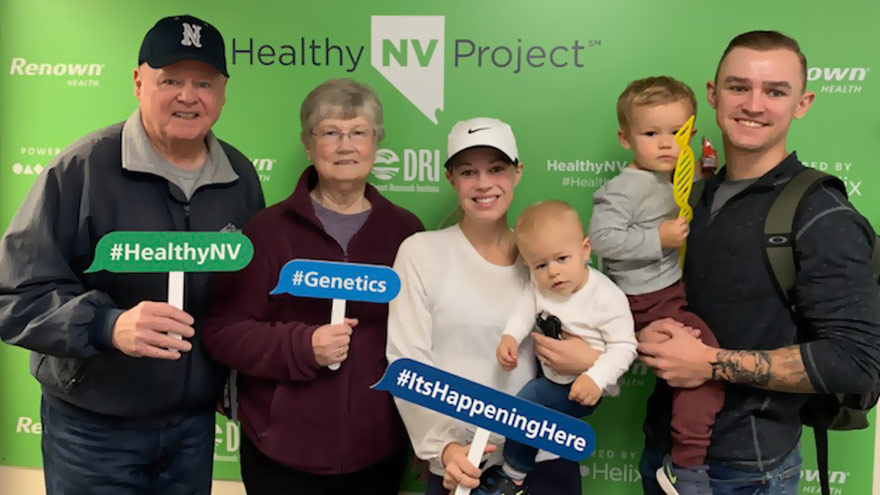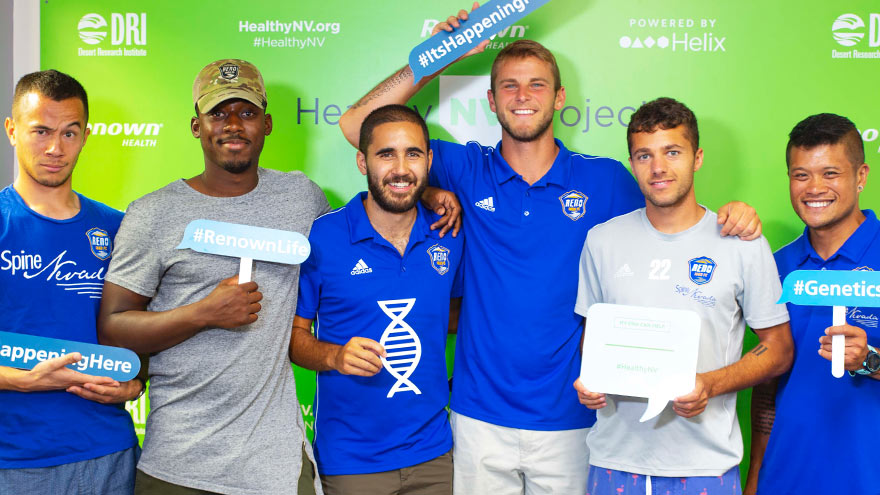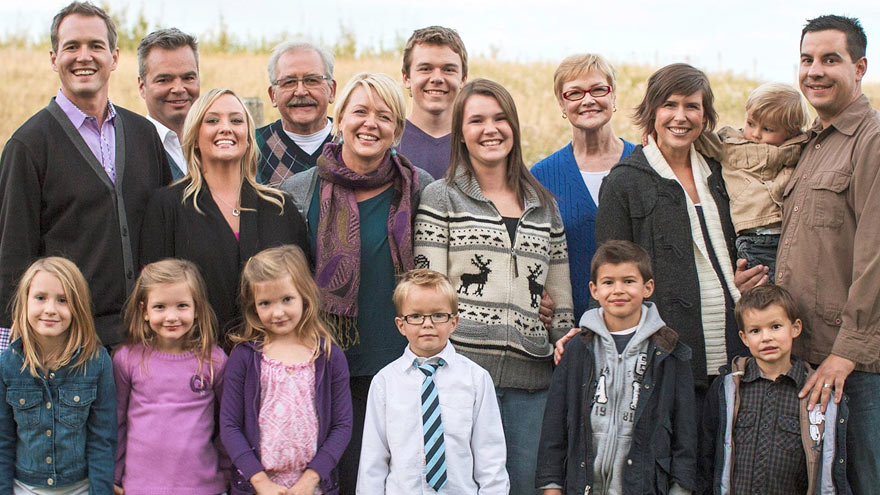Search
-
CEO Blog: Improving Health Through Genetics and Big Data
Renown Health President and CEO Tony Slonim, MD, DrPH, discusses efforts nationwide to develop a more effective and efficient way to deliver care. explains the benefits of Renown Health’s population health study with the Desert Research Institute and 23andMe.
Read More About CEO Blog: Improving Health Through Genetics and Big Data
-
The Healthy Nevada Project Changed My Life: A Local Mom's Story
Read about Jordan Stiteler, a local mom who says the Healthy Nevada Project provided insights into her family’s genetic makeup — and the likely cause of her dad and great grandfather’s deaths. Now she is changing her life due to her new diagnosis of familial hypercholesterolemia, which will allow her to take steps toward preventing the same fate. Jordan Stiteler’s dad died suddenly of a stroke nearly ten years ago — at only 45 years old. His grandfather died at age 40. Now through the Healthy Nevada Project’s no-cost genetic testing, she is closer to understanding why that may have happened. And she can take proactive steps to prevent the unhealthy symptoms that often lead to a stroke and heart problems. After getting her Geno 2.0 by National Geographic ancestry report, Stiteler got a call from Renown Institute for Heart & Vascular Health Cardiologist and Renown IHI Director of Research, Dr. Christopher Rowan. “They told me that I have FH, which is familial hypercholesterolemia,” she said. “I have genetically very high cholesterol because I have a non-functioning gene that doesn’t get rid of my cholesterol like a normal body would.” Familial Hypercholesterolemia: Simple Life Changes Dr. Rowan told Stiteler it is curable with medication and a change in lifestyle. Stiteler has embraced healthy lifestyle changes by exercising more and eating healthier. “It is so important. Being a mom, I think you have so much more to live for. Having this information has changed my life.” Stiteler feels confident FH affected her Dad. “It is helping my family realize that we need to get tested,” she said. “There were big milestones that my Dad missed. He didn’t get to see either of us get married or have our children. That was huge.” She has become passionate about sharing the need to join the Healthy Nevada Project as her way of helping to prevent other families from possibly going through what she and her family did with the early loss of her Dad. In addition to FH results, the Healthy Nevada Project is returning clinical results on BRCA 1/2 (hereditary breast and ovarian cancer) and Lynch syndrome (colorectal and endometrial cancer) to consenting study participants. To sign up for the Healthy Nevada Project, go to HealthyNV.org. Join the Healthy Nevada Project Recruitment for phase two is still open. In addition to opting in to receive clinical results, participants receive National Geographic’s Geno 2.0 ancestry app at no cost. They also have the chance to pick an additional app for health and wellness after completing a follow-up survey. Learn More or Sign Up
Read More About The Healthy Nevada Project Changed My Life: A Local Mom's Story
-
Healthy Nevada Project Returning Clinical Results to Participants
The Healthy Nevada Project – a first-of-its-kind population health study combining genetic, clinical, social and environmental data – has reached another landmark milestone. The study is notifying study participants at risk for familial hypercholesterolemia, BRCA and Lynch syndrome. “I took part in the Healthy Nevada Project to find out my ancestry. I didn’t even realize the test could give me so much information,” says 29-year-old Jordan Stiteler, who was recently diagnosed with familial hypercholesterolemia (also known as FH) through the Healthy Nevada Project. “After my dad passed away suddenly at age 45, I learned I had high cholesterol but I didn’t know it was genetic and I didn’t get an FH diagnosis until last week,” Jordan explains. “I immediately changed my diet, started walking more and doing more cardio. I also set up an appointment with my primary care physician for the first time in a while. I’ve talked with my family and even strangers about testing since my diagnosis. I hope my story will inspire others to test and can save someone’s family from going through the same loss I did.” Healthy Nevada Project Notifying Patients of Familial Hypercholesterolemia Risks Jordan is among the first Healthy Nevada Project participants to receive clinical results from the genetic study led by Renown Institute for Health Innovation (Renown IHI) – a collaboration between Renown and the Desert Research Institute Foundation. This groundbreaking population health study is now reaching out to study participants like Jordan, who asked to be notified of health risks. If study volunteers choose, the project will also provide guidance on treatment and additional testing for family members who may also be at risk. The project is starting with the return of FH risks which is a genetic tie to high cholesterol. Just a few months ago, a paper in the Journal of the American College of Cardiology recommended genetic testing become the standard of care for patients with a definite or probable FH diagnosis. Jordan says she plans to have her young son tested as well. “This is the future of health; not just reacting to sick people, but a coordinated effort between innovative technologies, data-driven researchers, and responsive practitioners to deliver personalized interventions to identify, prevent and treat disease,” says Anthony Slonim, M.D., Dr.PH., FACHE, president and CEO of Renown Health and president of Renown IHI. “As care providers, we often don’t see patients until they’re already sick and that’s a difficult problem. By embracing personal genomics, we can accelerate the ability of researchers to access data and apply those learnings back to our health system sooner.” In the Months Ahead: Notification of BRCA1/2 & Lynch Syndrome Risks The Healthy Nevada Project will start notifying study volunteers at risk for other CDC Tier 1 conditions including hereditary breast and ovarian cancer syndrome (BRCA 1/2 genes) and Lynch syndrome in the months ahead. These conditions are the key focus for the Healthy Nevada Project. The reason: Because early detection and treatment will save lives, and these conditions are some of the most common. “This research allows us to look into cancer, cardiac, respiratory illness and beyond to identify underlying causes, assess real risks and eventually initiate appropriate preventive actions much earlier. Human subject research is often intangible to participants – we are treated as subjects. The Healthy Nevada Project is creating actionable information for our participants while engaging in leading-edge research on health determinants,” said Joseph Grzymski, Ph.D., associate research professor at DRI, principal investigator of the Healthy Nevada Project and chief scientific officer for Renown Health. Landmark Population Health Study Continues to Expand Since launching two years ago, the Healthy Nevada Project has quickly evolved and expanded. The pilot project enrolled 10,000 participants in just 48 hours in September 2016. In March 2018, phase two of project expanded to an additional 40,000 participants with genetic testing partner, Helix. Helix’s genomic sequencing provides participants and researchers greater depth and quality of DNA data. With this, they can gain further insights to improve health. During a recent media roundtable announcing the return of clinical results, the Healthy Nevada Project also announced plans to complete testing of 40,000 people by the end of 2018. This will bring the project’s total enrollment to 50,000 people – approximately 10 percent of northern Nevada’s population. The Healthy Nevada Project hopes to reach more than 250,000 people in its next phase. The ultimate goal is to offer genetic testing to every Nevadan interested in learning more about their genetics and health. Join the Healthy Nevada Project Recruitment for phase two is still open. In addition to opting in to receive clinical results, participants receive National Geographic’s Geno 2.0 ancestry app at no cost. They also have the chance to pick an additional app for health and wellness after completing a follow-up survey. Learn More or Sign Up
Read More About Healthy Nevada Project Returning Clinical Results to Participants
-
Healthy Nevada Project: What We've Learned
As the Healthy Nevada Project expands to 50,000 study participants, researchers are sharing the health insights gleaned from the pilot phase of the project. Air pollution is a major health factor affecting northern Nevadans, according to data gathered by researchers in the pilot phase of the Healthy Nevada Project, one of the largest population health studies in the country. Today, the project — which began 18 months ago as a partnership between Renown Health and the Desert Research Institute — is expanding to add 40,000 additional participants bringing total enrollment to 50,000 Nevadans. “We are thrilled to share the first insights from our 10,000-person pilot phase and discuss how we will begin using those results to improve patient care,” says Anthony Slonim, M.D., Dr.PH., FACHE, president and CEO of Renown Health and president of Renown Institute for Health Innovation, a collaboration between Renown and DRI. Healthy Nevada Project Pilot Phase — and What Happens Next The pilot phase of the Healthy Nevada Project proved Nevadans are excited to know more about themselves and want to contribute to research that could improve health outcomes for the entire state. The pilot phase enrolled 10,000 participants in less than 48 hours and DNA sample collection from each participant was completed in just 69 working days. Based on pilot phase data, researchers have seen increased use of regional healthcare services correlated with fluctuations in air quality and so-called “bad air events” such as wildfires and atmospheric inversions. In phase two, Renown IHI will evaluate possible links between genetics and increased susceptibility to respiratory ailments. Study researchers also announced care providers and scientists will begin working on a number of clinical programs and scientific studies focused specifically on Washoe County’s high age-adjusted death rates for heart disease, cancer and chronic lower respiratory disease. Collectively, these conditions among local residents stand at 33 percent above the national rate. In the coming months, Renown IHI will begin providing advanced calcium score screenings to pilot phase participants at higher risk for cardiovascular disease. This will allow researchers to examine the link between genetics and calcium buildup in the heart. Researchers are also evaluating future studies focused on age-related macular degeneration and breast cancer risks in northern Nevada. Pilot Phase Insights Fifty percent of pilot study participants responded to a comprehensive, socioeconomic survey, which revealed: High rates of lower respiratory disease in northern Nevada and co-morbidities such as diabetes and hypertension suggest air pollution in northern Nevada is a confounding and significant factor in health. Study participants had parents who died from cancer and heart disease at a higher rate than the age-adjusted national average. Study participants exercised less than recommended by the American Heart Association and expressed interest in receiving help with behavior modification using diet/nutrition and weight loss tools. In phase two, if study participants choose to complete a follow-up survey, they will have the chance to pick an additional health and wellness app specific to their individual genetic results. Learn More To see if you are eligible to participate in the study, to sign up for study updates and for full details on the Healthy Nevada Project, please visit HealthyNV.org.
-
How to Fight Cancer that Runs in the Family
Your mother had breast cancer. Your uncle had colon cancer. A cousin has stomach cancer. Could yours be the next name to make the family cancer list? “Possibly,” says Dr. Robert Nathan Slotnick, MD, PhD, Medical Geneticist at Renown Medical Group. In this article, the doctor discusses the genetics behind Lynch syndrome — and how you and your family can fight it. What is Lynch Syndrome? Lynch syndrome, also known as hereditary non-polyposis colorectal cancer (HNPCC), is one of the most common genetic conditions known to increase cancer risk in individuals and families. It enables colon and other cancers to develop by causing mutations in mismatch repair (MMR) genes. “The genes MLH1, MSH2, MSH6, PMS2 and EPCAM normally help to repair damaged DNA,” explains Dr. Slotnick. “But when they don’t work properly, naturally occurring DNA replication errors are not repaired efficiently. These errors accumulate and cancer can be the result.” Colon cancer is just one of many possibilities. People with Lynch syndrome also have a higher risk of developing endometrial cancer (cancer of the inside lining of the uterus) as well as cancer of the ovaries, stomach, pancreas, kidney, brain, and bile duct, among others. These syndrome-enabled cancers often appear in patients before the age of 50. Family Cancer Clues The family connection to cancer is a strong one notes the doctor. “Cancer is best considered a genetic disease because it is always tied to changes (or mutations) in our inherited material: our DNA,” says Dr. Slotnick. “These DNA changes cause cells to lose control of their normal constraints on growth and metabolism and can allow abnormalities to develop.” “Although all cancers are genetic,” he adds, “not all cancers are hereditary or passed down through generations.” But because Lynch syndrome IS a hereditary condition, personal and family cancer histories provide invaluable information toward diagnostic confirmation and to a path of surveillance, prevention and treatment. Once a strong family history of cancer is confirmed, doctors and geneticists can move forward with targeted genetic testing to identify specific gene mutations. If Lynch syndrome is diagnosed, testing can also reveal your risk for associated cancers. And your results could be a wake-up call to family members. According to the Centers for Disease Control and Prevention (CDC), close relatives of people with Lynch syndrome have a 50% chance of having similar gene mutations and a higher risk of cancer. The good news is detection and prevention progress is being made. “Lynch is just one of many cancer syndromes where risk is tied to heredity,” explains Dr. Slotnick. “In the last few years, our ability to identify those at risk for this type of cancer predisposition has improved markedly, both in diagnostic accuracy and cost. This allows us to provide aggressive surveillance and prevention choices to individuals and families at risk. Healthier families and lower cost: it’s a win-win.”
-
Nonalcoholic Liver Disease and Genetics: Is There a Link?
What exactly is the relationship between genetics and disease? Powered by Renown Health, the Healthy Nevada Project is one of the most visible genomic studies in the United States. They are recruiting participants here in northern Nevada to understand the relationship between genetics and nonalcoholic liver disease. Joseph Grzymski, Principal Investigator at the Healthy Nevada Project and Chief Scientific Officer at Renown Health, shares why this study is so important and who should take part. Many people are aware that heavy drinking can lead to liver disease. Yet they are unaware that other types of liver disease are not caused by alcohol consumption. These types of liver disease are more difficult to diagnose but are equally dangerous. What is NASH? A build-up of fat causes nonalcoholic Fatty Liver Disease (NAFLD) in the liver. The most dangerous form is called Nonalcoholic Steatohepatitis (NASH). It causes inflammation and damages liver cells, leading to fibrosis, scarring of the liver, and decreased liver function. If NASH goes untreated, irreversible liver damage can occur, leading to cirrhosis, cancer, or liver failure. These conditions can be fatal. What’s most concerning about NASH is that the symptoms don’t typically cause pain and aren’t noticeable. The good news is that a new local study is raising awareness about this disease by recruiting at-risk people for NASH. Am I at risk for developing NASH? The following factors put you at risk: Obesity Type 2 diabetes Metabolic syndrome High blood lipids, such as cholesterol and triglycerides Does having a family member with nonalcoholic liver disease increase my risk? We do not know a lot about inheriting NASH, although a lot risk factors run in families. One goal of this study is to better understand the genetic component of NASH. There are certainly other risks too, such as environmental and behavioral risk factors. However, we don’t yet have a good grasp on how these impact NASH risk. How is NASH diagnosed? Diagnosis is traditionally done with either a liver ultrasound or biopsy. However, both procedures are expensive and the invasive biopsy has risks. Therefore doctors often use risk factors or less invasive blood tests for diagnosis. This NASH study will include a new blood test called the enhanced liver function (ELF) test. Doctors and researchers have data suggesting that the ELF test is a better diagnostic test for NASH risk. Conducting this cutting-edge test with study participants allows them to share results with their doctors to ensure the best care. What can I do to reduce my NASH risk? Limiting exposure to the risk factors of NASH often lowers risk. Eating a healthy diet, maintaining a recommended weight and exercising regularly can proactively lower your risk.
Read More About Nonalcoholic Liver Disease and Genetics: Is There a Link?
-
Taking Control of Her High Cholesterol and Health
In 2018, Jordan Stiteler became a Healthy Nevada Project advocate. Her DNA results revealed that she had Familial Hypercholesterolemia (FH). FH is a genetic condition that can cause high cholesterol. Since then, Jordan’s taken action to lower her cholesterol and make her family aware of this potentially dangerous condition. Read Part I of Jordan’s story Taking Control of High Cholesterol Looking at Jordan, an active young mother, you would never suspect she has high cholesterol. However, because of FH, Jordan’s cholesterol levels are unusually high. She chose to take action when learning of her FH gene, in order to maintain her long-term health. Jordan started by exercising more and eating healthier. “I’ve definitely been checking all the labels to see if the food has a lot of cholesterol, trans fats, or saturated fats,” she explains. She now eats a 100% plant-based diet which helps to lower her cholesterol naturally. Additionally, Jordan partnered with Dr. Michael Bloch, a lipid specialist, to monitor and manage her cholesterol. She told Dr. Bloch that she and her husband were planning on having a second baby. With this in mind, he helped Jordan create a plan to accommodate her pregnancy. Several months after giving birth to her beautiful daughter Logan, it was time to revisit her cholesterol treatment plan. Dr. Bloch prescribed Jordan a statin called Lipitor. It successfully cut her total cholesterol by half in just three months. “I had blood work done in November 2019 and my total cholesterol was 293 (normal is less than 199). I started taking cholesterol medication in February 2020. I had blood work done in June 2020 and my total cholesterol was 149, ” Jordan shares. “My LDLs went from 219 to 78! I am so grateful that the medication worked so well and so quickly! It’s a weight lifted off of my shoulders.” Although Jordan no longer limits herself to a strictly vegan diet, she is mindful of what she eats and how it affects her cholesterol. She’s thrilled that her cholesterol is now at a healthy level!
Read More About Taking Control of Her High Cholesterol and Health
-
Early Detection is Key to Surviving Colorectal Cancer
Colorectal cancer is the number two cancer killer in Nevada, only second to lung cancer, yet it is also one of the most preventable. Still, in 2020, 20.7% of Nevadans said they had never been screened for this deadly disease, according to the Nevada Cancer Coalition. At the start of the COVID-19 pandemic, unfortunately many healthcare services were halted, including colorectal cancer screenings. Those delays in screenings can lead to delays in diagnoses of colorectal cancer, resulting in poorer outcomes. Per the American Cancer Society, if colorectal cancer can be found early the relative 5-year survival rate is approximately 90%. Screening is key, and it is important to engage in preventative care. Even if you have no personal or family history of colorectal cancer, ask your doctor about colorectal risk factors and when to start screening, and if you’re up to date on your screenings, talk to loved ones and make sure they are too. According to the American Cancer Society, most colorectal cancer cases are found in those without a family history. This month let us help raise awareness for colorectal cancer and the importance of routine, life-saving screenings. To learn more, we spoke to Renown Health oncology nurse Christina Alsop, APRN. What is Colorectal Cancer Colorectal cancer is a disease in which the cells in the colon or rectum grow out of control. It usually forms from precancerous polyps, or abnormal growths, in the colon or rectum, which can become malignant without presenting any symptoms. How do Screenings Work Screening tests like stool tests, colonoscopies and others can detect these precancerous polyps, so they can be removed by a physician before turning into cancer. Screening tests can also find colorectal cancer early, resulting in better treatment outcomes. As of 2021, the U.S. Preventative Services Task Force recommends adults begin colorectal cancer screenings beginning at age 45, through 75. Screening methods include a blood stool test, which needs to take place every year or a colonoscopy, which takes place every 5-10 years. Healthy Habits Can Help Stave Off Risk Routine screenings are the only way to determine colorectal health, yet some healthy habits may reduce your risk for colorectal cancer. These factors include maintaining a healthy weight, being physically active, eating a diet rich in fresh fruits, vegetables and whole grains, limiting alcohol intake and not smoking.
Read More About Early Detection is Key to Surviving Colorectal Cancer
-
What is the Healthy Nevada Project?
The Healthy Nevada Project (HNP) is one of the most visible genomic studies in the United States, and guess what? Renown Health powers it! The Healthy Nevada Project (HNP) aligns with Renown's goal to do the best for our patients. The genomic study is at no-cost for Nevadans and gives participants insight into different genetic traits, including results on three prevalent and serious health conditions known as CDC Tier 1 conditions. CDC Tier 1 Conditions Include: Hereditary Breast and Ovarian Cancer Syndrome (HBOC) Lynch Syndrome Familial Hypercholesterolemia (FH) Not only does HNP give participants insights into their genetic background, but it also facilitates Renown's ability to study population health. Research lays the foundation for the future of medicine, and Renown's HNP is on the cutting edge of genetic research. We do this by providing skilled researchers access to studies for the diseases that currently have limited treatment, including nonalcoholic steatohepatitis liver disease or NASH. For example, the observational NASH study helps researchers understand genetic links to the disease. Make an Appointment to Get Screened If you haven't already, join the over 55,000 HNP participants and make an appointment to have yourself screened. You can schedule a screening appointment through MyChart. Click “Schedule an Appointment" and select Research Appointment - Genetic Screening. Prior to your appointment, please complete e-Check-in and complete your consent form.
-
Staying Heart-Healthy with Genetic Screening
February is American Heart Month. While cardiac care is crucial every time of year – especially as heart disease stays the number one killer in the United States – American Heart Month serves as a great reminder to stay on top of your heart health. We spoke with Malina Ruiz, a cardiology nurse practitioner at Renown Health, on three key ways to embrace heart-healthy living and how genetic screening can help inform you of certain genetic risks that can play a role on the cardiac life stage. 1. Invest in a heart-healthy diet. Eating a diet that is rich in fruits, vegetables, whole grains and healthy fats (including monounsaturated fats such as avocados and polyunsaturated fats such as sunflower oil) is a key defense in protecting your cardiac health, according to Malina. While you are filling your plate with these nutritious foods, remember to keep an eye on your saturated and trans-fat intake, and try limiting foods that are high in those fats. “No matter what age we are, maintaining a heart-healthy diet will always be important,” said Malina. Need help finding cardiac-friendly meals? The National Heart, Lung and Blood Institute makes it easy with heart-healthy recipes and tips from experts. 2. Do an exercise audit. “Keeping an active lifestyle during our younger years is one of the most important factors that affect heart health in future years,” said Malina. Maintaining a regular exercise regimen that allows you to raise your heart rate and break a sweat can help prevent future cardiac events. A good rule of thumb is to aim for 150 minutes a week of moderate-intensity exercise, which averages out to 30 minutes a day on 5 days out of the week. It’s never too late to start a regular exercise routine! Exercise doesn’t have to be something you dread – leverage American Heart Month to find activities that you enjoy. The American Heart Association can help you discover new ways to move your body. At the end of the day, as Malina emphasizes, “any movement is better than nothing!” 3. Don't skip those check-ups. Regular preventative visits with your primary care provider can help you identify possible risk factors for heart conditions before they start actively affecting your life. “Check-ups become even more important as we age, along with being aware of the signs and symptoms of heart disease, heart attack and stroke,” added Malina. There’s no time better than the present – call our expert scheduling team today at 775-982-5000 to request a preventative check-up with your primary care provider.
Read More About Staying Heart-Healthy with Genetic Screening









